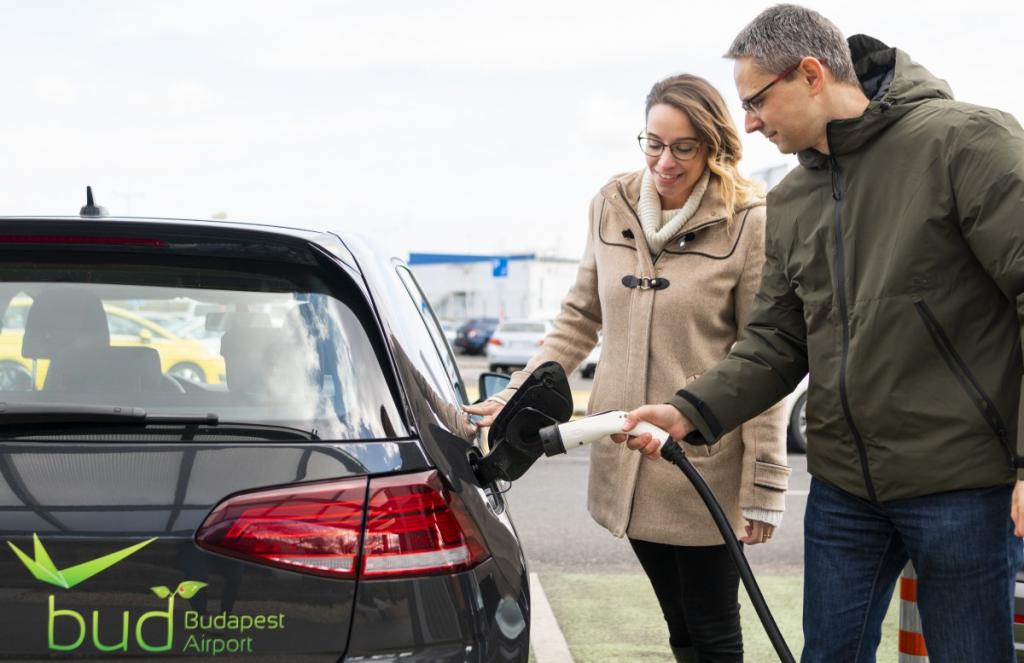Thessaloniki gets ready for its metro launch in November
The underground rapid transit lines have been under construction for almost two decades due to various project delays
 TheMayor.EU logo
TheMayor.EU logo 
Budapest airport will become one of the most electric-car-favorable airports , Source: Budapest Airport
Most of them will be used by service vehicles, as authorities aim for the 'net zero airport' label by 2023
Recently, Budapest Airport has announced its latest step towards sustainability with the installation of 176 charging stations for electric vehicles. The charging stations will be installed both inside and outside the airport, meaning that they will service a growing fleet of maintenance vehicles and private passengers.
Airport authorities have been moving towards reaching net-zero emissions at an impressive pace, with the milestone set for 2035 at the latest. In 2021, the airport halved its emissions compared to 2010 levels and is now considered a level 3+ Airport Carbon Accreditation Score. Airport CEO Chris Dinsdale also said that Budapest Airport will try to achieve the 4+ score in 2023. It is the highest one and means that an airport is completely carbon neutral.
According to a statement by the airport, recently they have replaced 76 service vehicles and 10 manager cars with electric alternatives. This transition has saved them 140,000 litres of fuel, or the equivalent of 350 tons of CO2 emissions per year.
However, this is far from the total amount of vehicles the airport operates and the 31 EV charging stations that are currently in service will have to be expanded to accommodate the growing demand.
The announced 176 charging stations will be built at the airport over the next 3 years and they will mainly accommodate the needs of ground service vehicles, airport vehicles and the service vehicles of the partner companies at the airport. The airport has also announced that 134 of the stations will be provided thanks to funding from the European Union to the tune of 1.6 million euros. The rest will be funded by the airport itself.
Budapest Airport currently has a level 3+ from the Airport Carbon Accreditation. In laymen's terms, this means that they have mapped their emissions and taken primary steps to reduce them. After that, airport authorities started working with different operators to monitor and curb as many take-offs and landing emissions.
At the same time, Chris Dinsdale, CEO of Budapest Airport, explained that the airport aims to get the highest accreditation of 4+ in 2023. This means that, instead of monitoring take-off and touch-down emissions and working to reduce waste, the airport needs to have cut everything it could have, while the rest of its emissions need to be offset by carbon credit.
According to Dinsdale, the lion’s share in carbon dioxide emissions reduction should come from a photovoltaic park the airport plans to install. Plans for the renewables system call for a massive investment, to make the airport energy independent.
Dinsdale concluded: “It takes many small and quite a few giant steps to implement our plans and, more importantly, to act responsibly and turn words into deeds, as a community.”
Airport Carbon Accreditation is the only global carbon management certification programme for airports, endorsed by institutions. It is an independent organisation that analyses airports’ emissions and pushes for sustainability while providing a unifying framework and benchmarking goals.
It also gives out labels on one of six levels, while outlining a clear path of ascension towards greener airports. The levels include ‘Mapping’, ‘Reduction’, ‘Optimisation’, ‘Neutrality’, ‘Transformation’ and ‘Transition’. It is a programme for airports of all sizes, extending beyond hubs and regional airports with scheduled passenger traffic, to include general aviation and freight-focused airports.

The underground rapid transit lines have been under construction for almost two decades due to various project delays

Now you can get your wine in Talence by paying directly in Bitcoin

That’s because the state has to spend money on updating the railway infrastructure rather than subsidizing the cost of the popular pass

Rethinking renewable energy sources for the urban landscape

The examples, compiled by Beyond Fossil Fuels, can inform and inspire communities and entrepreneurs that still feel trepidation at the prospect of energy transition

Now you can get your wine in Talence by paying directly in Bitcoin

The 10th European Conference on Sustainable Cities and Towns (ESCT) sets the stage for stronger cooperation between the EU, national and local level to fast track Europe's transition to climate neutrality.

At least, that’s the promise made by the mayor of Paris, Anne Hidalgo

The underground rapid transit lines have been under construction for almost two decades due to various project delays

At least, that’s the promise made by the mayor of Paris, Anne Hidalgo

Hostal de Pinós is located in the geographical centre of the autonomous region

Despite its church-y name, the district has long been known as the hangout spot for the artsy crowds

Urban dwellers across the EU are having a say in making their surroundings friendlier to people and the environment.

Forests in the EU can help green the European construction industry and bolster a continent-wide push for architectural improvements.

Apply by 10 November and do your part for the transformation of European public spaces

An interview with the Mayor of a Polish city that seeks to reinvent itself

An interview with the newly elected ICLEI President and Mayor of Malmö

A conversation with the Mayor of Lisbon about the spirit and dimensions of innovation present in the Portuguese capital














